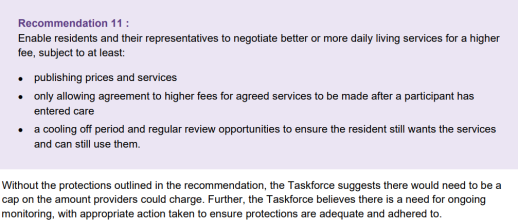Taskforce confirms a future for additional services

The final Taskforce report recommends additional service fees be embedded into the basic daily fee for both supported and non-supported residents.
Over the past few years, all the signals have been that the government-funded elements of the aged care system would provide a safety net and that consumer co-payments would support consumer choice. In the face of these signals, we always anticipated, and indeed, it was flagged to us in conversations we were having with key players that additional services would have a central role in any revised funding regime.
To those who are considering implementing additional services, the publishing of the recommendations should remove any reticence you had to sign up and work with Pride Aged Living to embed additional services in your offer.
Let us take you through what we see as the key issues contained in the Taskforce recommendations:

Department of Health and Aged Care - Final report of the Aged Care Taskforce, 12 March 2024
Alignment with our Additional Services program
At a high level, our Additional Services program is consistent with the Taskforce’s recommendations. Our programs are transparent, include price disclosure, and apply to services outside of “Specified Care and Services.”
Our ongoing monitoring protocol of residents' capacity to benefit ensures residents receive value for their additional services payment and, as appropriate, supports an opt-out approach.
The Taskforce has suggested that without the recommended protections contained in the box above, there should be a price cap on additional service fees. How this cap would work is not explained. It could be similar to the higher RAD cap, where approval from IHACPA is required if you want to set a price above the cap or it could be an absolute cap. While we do not consider either of these options is likely to be adopted, approval above a cap would be our preferred model.
A feature of our programs is their universal application to all residents, including supported residents. In the example given on page 28 of the report, the Taskforce specifically endorses the application of additional service fees to supported residents. The recommendation to maintain the Basic Daily Fee at 85% of the pension ensures that supported residents will continue to have the capacity to pay the discounted additional service fee within our programs.
The recommendation that additional services will be agreed upon after entry is inconsistent with our programs and is a matter of practical concern to us. If the post-admission choice approach is legislated, it opens the possibility that you may have two classes of residents within a facility. This is a matter we know is of concern to many of our clients. It also creates many practical issues in billing, logistics, room set-up and staff having to know which residents are entitled to specific elements of the program.
While there are real operational challenges in the recommended approach, it is fundamentally a manageable change to our current approach. The best way to address people's desire to opt-out is to have a clearly articulated package of services that represent real value and communicate this value to potential residents. Provided there is value in the package and it is affordable, then just as the current experience of our clients is that potential residents agree to pay the fee. We expect a negligible rate of consumers seeking to opt out of the program if it is a post-admission choice. This is where our expertise and the experience gained from implementing additional services in over 20,000 places provide the assurance providers need and want.
We were alerted to this possible approach some months ago. This prompted us to make representations to Taskforce members and the Department:
Residential Aged Care Briefing Paper
We will continue our efforts to explain the practical challenges in the suggested and will likely call on providers with additional services programs to make direct representations on this matter.
This view, contained on page 28 of the report, suggests the need for a compliance monitoring regime associated with additional services programs. The additional services landscape is continually changing, creating the risk of ongoing compliance and complaints. Our ongoing support program is designed to assist providers in managing these issues and provide independent assurance that their programs remain relevant and compliant.
Congratulations to providers who already subscribe to our ongoing support service. For providers who have developed their additional services offer without our assistance, we can provide an ongoing support program for you!
Final thoughts
In conclusion, the Taskforce recommendations relating to additional services present no surprises to us. They are consistent with the user pays, consumer choice framework that is well established in aged care and many other government-funded programs.
The Taskforce acknowledges it has made high-level recommendations. These need to be translated into government policy and then into legislation. As additional services do not have a budgetary impact, we consider it likely that the future additional services regime envisaged by the Taskforce could be incorporated into the new Aged Care Act when it becomes law, scheduled for July 2024.
History tells us that existing provisions are grandfathered, so we encourage all providers who are considering implementing the Pride Aged Living Additional Services program to act now and drive the strategic direction of their operations!
To find out how we can assist your organisation with Additional Services, contact James.
James Saunders
02 9068 0777
james.saunders@prideagedliving.com.au
